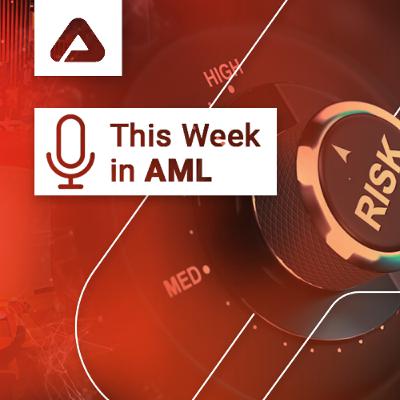Discover AML Conversations
AML Conversations

AML Conversations
Author: AML RightSource
Subscribed: 236Played: 9,531Subscribe
Share
© All rights reserved
Description
AML Conversations is dedicated to inform professionals and those interested in anti-money laundering about conversations happening in the government, private sector, and internationally. Throughout the series John Byrne, AML RightSource Vice Chairman, will interview industry experts or participate in live programming or panel discussions related to the industry.
486 Episodes
Reverse
In this week’s episode, Elliot and John cover a fast-moving slate of anti–financial crime developments across the U.S. and around the globe. They break down former President Trump’s multibillion-dollar lawsuit against JPMorgan, evolving debates over U.S. regulatory burden and supervisory staffing at the Federal Reserve, and new legislative pushes to change AML reporting thresholds.
Internationally, they explore AMLA’s next steps toward direct supervision of 40 high-risk EU financial institutions, significant enforcement actions in Spain and the U.K., and Austrac’s probe into payments giant Airwallex. The conversation also highlights new leadership at the Wolfsberg Group, Europol’s report on skyrocketing maritime cocaine trafficking, and crypto crime findings from Chainalysis and TRM Labs.
The episode closes with a discussion of recent money laundering cases and industry responses to the tragic Minneapolis shooting.
In this episode, Elliot Berman and John Byrne take a wide-ranging look at major developments shaping the AML and financial crime landscape worldwide.
The conversation begins in Europe, with updates on the transition to the EU’s new Anti-Money Laundering Authority (AMLA), and early work to standardize suspicious activity reporting across EU member states. From there, the discussion turns to international cooperation, including public-private partnerships in Canada’s fight against human trafficking, and regulatory coordination on cyber threats between the UK and EU.
Back in the U.S., Elliot and John examine recent staff reductions at FinCEN, reflect on leadership changes at IRS‑CI, and discuss the implications of presidential pardons involving financial crime. The episode also highlights scam risks targeting retirees, ongoing debates around digital asset regulation and the proposed Clarity Act, and what financial institutions should be watching next.
In this episode, Elliot Berman and John Byrne discuss a fast-moving week across the global financial crime landscape. They unpack the Charity & Security Network’s shadow report ahead of the U.S. FATF evaluation, the UK’s proposed updated “debanking” rules, and recent European regulatory developments—from Poland’s MONEYVAL review to the Dutch Central Bank’s call for proportionality.
The conversation also covers international efforts against cultural property trafficking, Sweden’s new red‑flag guidance for funds transfer providers, FinCEN’s geographic targeting order in Minneapolis, and the White House’s announcement of a new DOJ Division for National Fraud Enforcement. Elliot and John also discuss upcoming legislative conversations around raising CTR and SAR thresholds.
In this episode of AML Conversations, Elliot Berman is joined by Christopher Sindik, Senior Director of Third‑Party Risk and Due Diligence at Blue Umbrella, for a deep dive into the Foreign Corrupt Practices Act (FCPA) and the recent deferred prosecution agreement involving Tigo Guatemala, Millicom, and the U.S. Department of Justice.
Elliot and Christopher break down how the misconduct unfolded, why the joint‑venture structure created an environment ripe for corruption, and what lessons compliance professionals can draw from the case. The conversation explores practical strategies for strengthening third-party risk management, including intrinsic and acquired risk factors, enhanced controls for high‑corruption jurisdictions, and the critical role of data analytics and AI in detecting anomalies.
They also discuss the importance of tone from the top, resource allocation for compliance programs, whistleblower protection, and how companies can ensure that legitimate services are properly documented and auditable. The episode highlights how proactive self-disclosure and robust compliance frameworks can significantly impact outcomes in enforcement actions.
In this episode of This Week in AML, Elliot Berman and John Byrne unpack a fast‑moving start to 2026 across the financial crime, regulatory, and geopolitical landscape. They discuss the U.S. military’s recent operation in Venezuela and its potential sanctions implications, FinCEN’s holiday‑week rule changes—including the extension of AML/SAR requirements for investment advisers and new guidance preparing the industry for the residential real estate reporting rule—and the OCC’s renewed warning about voluntary SAR misuse.
The conversation also explores brewing crypto legislation in the U.S., the implementation of the OECD’s Crypto‑Asset Reporting Framework in the EU and UK, and the Netherlands’ new €3,000 cash‑transaction ban. International stories include a troubling investigation into U.S.-registered aircraft ending up in drug‑trafficking networks and FIFA’s controversial decisions involving Russian clubs amid global sanctions.
In this second part of our year-in-review series, Elliot Berman and John Byrne examine the major developments from July to December 2025. From Treasury’s delay of the investment advisor rule and the adoption of the GENIUS Act to the staggering $2 billion in crypto theft, the conversation covers critical shifts in financial crime prevention. They discuss staffing cuts at the State Department, EU fintech risk assessments, FATF’s new national risk assessment toolkit, and the humanitarian toll of sanctions. Other highlights include AMLA’s growing role in EU crypto oversight, AUSTRAC’s crackdown on casino compliance, and global enforcement trends. Plus, insights on OCC’s testimony signaling regulatory priorities for 2026 and FATF’s report on combating online child exploitation. Stay informed as we close out a turbulent year in compliance.
In this special year-end episode of This Week in AML, Elliot Berman and John Byrne look back at the first half of 2025—a period marked by sweeping changes and global challenges. From the surge in executive orders and controversial pardons in the U.S. to the EU’s Digital Operational Resilience Act and FATF updates, the discussion covers key developments shaping compliance. They explore DOJ’s shifting enforcement priorities, OCC’s growing influence on crypto and banking charters, debates over the Corporate Transparency Act, and the rising costs of AML compliance. Plus, insights on human trafficking detection, cybersecurity threats, and the resurgence of check fraud. This is your comprehensive recap of a chaotic year in financial crime prevention.
In this candid year-end conversation, John Byrne and Sarah Beth Felix dissect an unprecedented year in AML enforcement. Felix, President of Palmero Consulting and creator of "Dirty Money Weekly," describes what she sees as systematic dismantling of AML infrastructure despite stated priorities of combating fentanyl and transnational criminal organizations. With only four enforcement actions from traditional federal banking agencies compared to FINRA's 20+ penalties, the landscape has shifted dramatically.
The discussion explores Treasury's proposal to give FinCEN veto authority over banking agency BSA decisions - a move Felix warns could create massive bottlenecks. They examine troubling patterns in recent OFAC sanctions penalties where entities disregard guidance while violations flow through traditional banks. Felix shares skepticism about AI replacing the "hyper suspicious" human judgment essential to AML work, noting AI tools consistently fail basic sanctions questions.
The conversation addresses the stark gap between U.S. and European cryptocurrency regulation, with America applying 40-year-old money service business laws to digital assets while the EU has comprehensive frameworks like MiCA. Looking ahead to 2026, Felix urges AML officers to use reduced regulatory scrutiny strategically - eliminating legacy policies that waste time while remembering everything missed now can trigger future enforcement. She emphasizes focusing on cartels and foreign terrorist organizations, which now carry criminal liability for banking officers, and proactively auditing customer sanctions programs.
In this episode of This Week in AML, Elliot Berman and John Byrne unpack the latest developments in financial crime compliance. They discuss the U.S. Court of Appeals decision upholding the Corporate Transparency Act, new guidance from France’s TracFin on detecting shell companies, and FATF’s mutual evaluation of Belgium under its updated regime. The conversation also covers global civic space concerns, major enforcement actions in the U.S. and UK, IRS-CI’s annual report highlights, and the OCC’s conditional approval of crypto trust charters. Plus, breaking news on sanctions and fentanyl designations.
In this episode of AML Conversations, John Byrne discusses the evolving landscape of communication in the context of anti-money laundering (AML) and financial crime prevention with experts Justin Cole (First Pitch Communication) and Joe McNamara (AML RightSource). They explore the paradigm shift in how communication is integrated into investigations, the importance of legal considerations, the role of data verification, and the impact of investigative journalism. The conversation also delves into the ethical implications of using AI in communication and the future challenges facing the financial crime prevention space.
Link to Justin's Article: https://www.amlintelligence.com/2025/10/insight-why-the-media-has-become-the-front-line-for-fighting...
In this episode of AML Conversations, host John Byrne sits down with Dr. Gabriel Velez, associate professor at Marquette University and author of Making Meaning of Justice and Peace: A Developmental Lens. They explore how peace education and restorative practices shape young people’s understanding of justice, belonging, and community—both in Colombia and Milwaukee. Dr. Velez shares insights on conceptualizing peace, the challenges of fostering optimism in turbulent times, and practical steps for encouraging youth engagement.
In this episode of This Week in AML, Elliot Berman and John Byrne dive into International Anti-Corruption Day and explore contrasting approaches to corruption and financial crime across the globe. From the UK’s ambitious anti-corruption strategy and new FCA tools to the Basel AML Index findings, AUSTRAC’s compliance updates, and EU fraud crackdowns, the discussion highlights global trends and challenges. The hosts also examine recent U.S. developments, including OCC guidance on crypto transactions and the newly released National Security Strategy, offering a perspective on what these changes mean for compliance professionals.
In this episode of This Week in AML, Elliot Berman and John Byrne unpack a pile of developments across the globe. From the EU’s decision to add Russia to its AML blacklist and phase out Russian gas imports, to major enforcement action against a crypto mixer, the conversation dives deep into the evolving financial crime landscape. They also cover Canada’s updated guidance on politically exposed persons, U.S. alerts on cross-border transfers, OCC’s changes for community banks, and a surprising OFAC penalty tied to real estate sanctions. Plus, insights on humanitarian access challenges and upcoming year-in-review discussions. Stay informed on what’s shaping compliance and risk management today.
In this special Thanksgiving edition of This Week in AML, Elliot Berman and John Byrne break from tradition to spotlight the Financial Action Task Force (FATF) and its three 2025 plenaries. They explore key developments, including updates to FATF standards, mutual evaluations, financial inclusion initiatives, and the evolving global stance on virtual assets. The episode also covers jurisdictional changes in monitoring status, new guidance on asset recovery, and FATF’s forward-looking Horizon Scan addressing emerging tech threats like generative AI and deepfakes. Tune in for a comprehensive overview of FATF’s strategic direction and its impact on the global AML landscape.
In this episode of AML Conversations, Joe McNamara speaks with David Lutz, Associate Director of the AML RightSource Financial Crime Advisory group about the evolving Crypto landscape, recent milestones in the space, and how recent legislation has opened the door to further legitimacy and regulation. The cryptocurrency industry is experiencing its fintech moment - trading the freedom of the Wild West for legitimacy in the regulated financial system. With the GENIUS Act establishing the first federal framework for stablecoins and new EU travel rule requirements taking effect in 2026, crypto exchanges must now meet higher AML standards that align with the expectations of traditional banking partners.
In this episode of AML Conversations, John Byrne speaks with Thalia Malmberg and Sangeeta Goswami from the Human Security Collective about the ripple effects of global AML/CFT frameworks on nonprofit organizations. The discussion explores FATF Recommendation 8, recent revisions aimed at reducing harm, and the challenges of striking a balance between security and financial inclusion. Learn why unintended consequences matter, how they affect humanitarian efforts worldwide, and what financial institutions can do to foster risk-based approaches without stifling legitimate charitable work.
In this episode of This Week in AML, Elliot Berman and John Byrne cover a wide range of pressing financial crime topics. They discuss FATF’s latest report on combating online child exploitation, the UK’s Economic Crime Survey findings on sanctions awareness and fraud, and updates from FinCEN on cartel-linked gambling establishments. Other highlights include enforcement actions against elder fraud, tariff evasion prosecutions, and regulatory changes at the Federal Reserve. Tune in for expert analysis and actionable insights for compliance professionals.
In this episode of AML Conversations, John Byrne sits down with Dan Tannebaum, Partner at Oliver Wyman and global leader in anti-financial crime, for a wide-ranging discussion on the evolving landscape of sanctions. From the EU’s post-Ukraine enforcement challenges to the U.S.'s shifting approach under different administrations, Dan offers sharp insights into the effectiveness, limitations, and unintended consequences of sanctions as a policy tool.
They explore:
Key differences between U.S. and EU sanctions regimes
The impact of sanctions on Russia, Syria, Cuba, and Venezuela
The growing complexity of sanctions evasion tactics
How AML professionals can stay ahead in a rapidly changing environment
The future of sanctions as a tool of economic statecraft
Whether you're a seasoned compliance officer or new to the field, this episode offers practical takeaways and a candid examination of the geopolitical forces shaping financial crime risk today.
In this episode of This Week in AML, Elliot Berman and John Byrne dive into a wide range of developments shaping financial crime compliance worldwide. From controversial U.S. pardons and their implications for corruption cases, to Australia’s staggering $82 billion organized crime costs, and the UK’s new anti-fraud campaign targeting crypto scams—there’s plenty to unpack. The discussion also covers the Bank of England’s stablecoin limits, the latest Global Organized Crime Index findings, intelligence-sharing breakdowns between allies, major sanctions relief for Syria, and a record AML fine against JP Morgan in Germany.
In this episode of This Week in AML, Elliot Berman and John Byrne cover a wide range of global developments impacting financial crime compliance. Topics include new OFAC sanctions targeting North Korean cybercrime and updates from New York's Department of Financial Services on cybersecurity compliance. They also discuss the UN's new Cybercrime Convention, the closure of sanctioned Mexican banks, and identity verification reforms in the UK. Additional highlights include regulatory updates from the European Banking Authority, FINTRAC’s annual report, corruption investigations in Portugal, and California’s new data privacy laws. Tune in for insights on how these changes may shape AML strategies worldwide.
























Anti-Money Laundering (AML) refers to the set of laws, regulations, and procedures designed to prevent criminals from disguising illegally obtained funds as legitimate income. AML policies are essential in the global fight against financial crime, aiming to detect and report suspicious activities related to money laundering and terrorist financing. Key components of AML include customer due diligence (CDD), continuous monitoring of transactions, and reporting suspicious activity to relevant authorities. Financial institutions and other entities are required to comply with AML regulations to ensure transparency and integrity in financial systems, ultimately protecting the economy and society from the adverse effects of illicit financial flows. So i one want to become specialist then finding good AML foundations https://amlcertification.com/courses/aml-foundations/ is a key